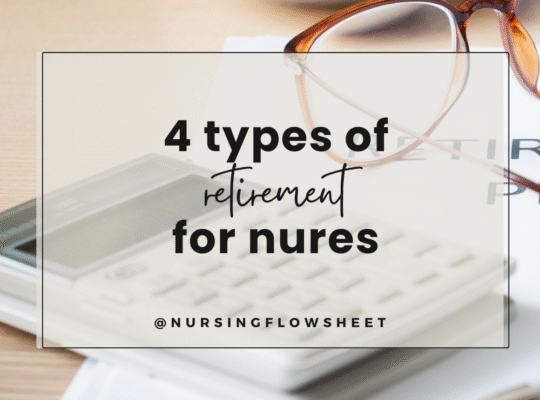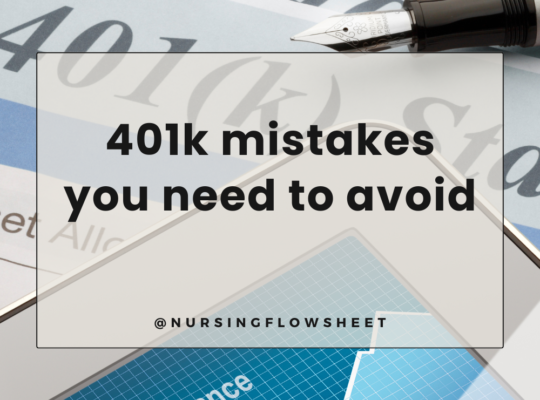
As healthcare professional, you work hard for your money. Why not make money work for you?
Investments are vehicles that drive financial security. This means that they help you to stay financially buoyant now and maintain a steady cash flow in the future. But, most times the challenge lies with how to start investing.
Where Should You Invest?
Types of Investment Accounts
Employee Sponsored Retirement Accounts
Start with your 401k [could be a 403b or 457]
A 401k is an employer-sponsored retirement account. Just like every other retirement account, you deposit a specific percentage of your salary account. However, your money grows in a 401k account, rather than remain dormant.
The major benefit of a 401k account is tax efficiency. Contributions in a 401k are pre-taxed and then tax-deferred. This means that you contribute money before it is taxed and then you pay taxes on your money when you withdraw after age 59 ½ or 55 years if you’ve retired.
This lowers your total taxable income, you may pay lower tax when you withdraw the funds in retirement than if you were taxed on the money now.
Another key advantage of investing in a 401(k) is that the account offers compound interest. This means that in addition to the interest you earn on your principal, you still earn interest on the accumulated interest. You can make huge sums on long-term investment through compounding.
You can also benefit from a 401k match. A 401(k) match simply means that your employer contributes to your 401(k) account based on the amount you contribute. However, this is dependent on the terms of your employer’s 401(k) plan.
Most companies offer an average match of 4.3% of your pay. But, the commonest match is 50 cents on the dollar. That is, for every $1 you contribute to your company 401(k), your company will contribute 50 cents.
After you do your employee match, open a Roth IRA
A Roth IRA is an individual retirement account that provides tax-free growth and withdrawals. Just like the 401k, your contributions are pre-taxed in a Roth IRA and also compound. But, your withdrawals in retirement are tax-free; you won’t pay any tax when you withdraw in retirement.
So, Roth IRA offers:
● Tax efficiency
Your tax may be lower when you pay it earlier rather than at retirement. And, withdrawal in retirement is also tax-free.
● Easy withdrawals.
Unlike some other retirement accounts that only let you withdraw your money at retirement, you can withdraw anytime.
● Flexibility
You can choose when and how much you contribute to a Roth IRA.
READ THE BENEFITS OF A ROTH IRA ACCOUNT
Don’t forget that you can contribute to a Roth IRA and a 401(k) at the same time.
There is no age limit for contribution. You can open an account and start contributing as long as you are earning.
HSA (Health Savings Account)
Health Savings Account (HSA) is a savings account with a tax advantage. It lets you save your money on a pre-tax basis to pay for qualified medical expenses if you have high-deductible health plans (HDHPs).
Your contributions in a HSA are tax-deductible and you can withdraw money tax-free as long as it’s for eligible medical expenses.
So, if you invest in HSA, at retirement you can pay for some health insurance premiums, including for Medicare Part B and long-term care. You’ll also benefit from tax-free growth on your investment.
What investments should you buy?
Stocks
Stock investment is one of the recommended investment options. You buy a company’s share with the view of making more money in the future when the share price increases.
Index Funds
Both Index funds and mutual funds allow you to invest in a variety of stocks. However, the main differences between the two stock investment options lie in the management and earning potential.
Mutual funds are actively managed; investment experts manage your investment, reducing the chances of a loss. On the other hand, index funds are more passive.
Also, mutual funds require higher fees than index funds. This makes the index funds more promising for higher returns.
LEARN HOW TO INVEST IN INDEX FUNDS HERE
Conclusion
There is no better time to start investing than today. However, you may need to get a financial advisor to help you manage your investment to reduce losses.
You can go for Robo-advisors or human financial advisors. Robo advisors use computers to build and manage your investment portfolio. Human Financial advisors, in addition to managing your portfolio, acts as a coach to ensure you reach your financial goals.
Or you can also invest on yourself & learn about Investing so you can manage your own portfolio.
Have you started investing today?







